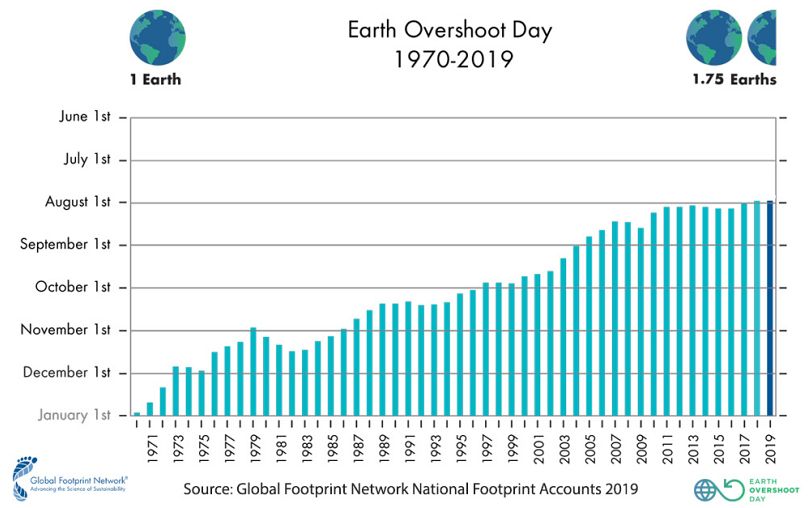In just 7 months we have used our natural resources for the year
Once again, in line with trends over the past 20 years, humanity has reached Earth Overshoot Day earlier than ever before. Last year it fell on August 1st and has moved up several days to fall on July 29th this year. Since 1999 this date, which signifies the day on which we have used the planet’s share of resources for the year, has moved up two months.
This incredible increase in resource consumption means that humanity is using natural resources at 1.75 times the rate that they can regenerate. Our overuse of our planetary resources is becoming increasingly clear as deforestation, loss of biodiversity, and extreme weather conditions as a result of climate change are unavoidable realities of daily life for a significant proportion of the planet.
Independent think tank, Global Footprint Network calculates the date of Earth Overshoot Day each year in the hope that it will encourage people to think about the individual impact of their actions. Their campaign, ‘#MoveTheDate’ highlights already existing solutions for cutting fossil fuel emissions and states that, if we were to move the date back by 5 years we could reach one planet a year usage by 2050.
The think tank states that cutting CO2 emissions from fossil fuels by 50% could move the date back by 93 days. It identifies 5 main areas in which we need to reconsider how we consume resources including food waste and city living.
These areas are cities, energy, food, planet, and population. In an effort to increase awareness of solutions here is some further reading from each category.
Cities
Reducing our footprint from driving by 50% would move back Earth Overshoot Day by 11.5 days. Why not try an electric scooter instead?
Energy
Reducing our reliance on fossil fuels is essential to reducing our consumption of resources. Existing technologies can be used to increase renewable energy and eventually replace the CO2 heavy methods we use now. How well is your country doing?
Food
By adopting a vegetarian diet and reducing global meat consumption we could influence the 26% of the global ecological footprint that is made up by food. Just China alone eating 50% less meat would move Global Overshoot Day back 3 days! If you are considering going vegan, here are some tips on making the transition.
Planet
The 'web of life' that makes up our ecosystem is vitally important to keeping the planet liveable. Forests regulate the climate and absorb carbon emissions. Some companies, like Lush, are looking to create products that reinstate biodiversity through reforestation.
Population
Are condoms good for the environment? Empowering girls and women to think about birth control leads to smaller, healthier families. The more people the less planet for each person.
Solutions already exist that are effective and affordable, #MoveTheDate seeks to spread knowledge of their existence to help increase speed of implementation.
Global Footprint Network have created a tool so you can calculate your own ecological footprint and help encourage you to think about ways you can reduce your own individual impact. You can find it here.

















